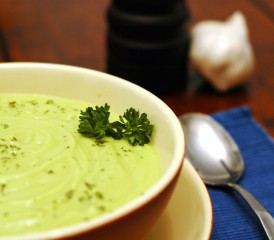Advice for Cancer Patients with Difficulty Swallowing Foods
Health & WellnessWritten by Tejal Parekh, RDN, LDN | Edited By Walter Pacheco

Cancer patients often have difficulty swallowing foods, a condition also known as dysphagia.
It’s a common symptom among people diagnosed with mesothelioma, particularly patients with pleural mesothelioma. The pressure on the lungs stemming from the illness affects breathing and swallowing.
Dry mouth from chemotherapy can also cause the condition and force the person to eat less.
Because eating is severely restricted, it can become a major complication for the patient, possibly leading to significant weight loss. Maintaining good nutrition is key to fighting cancer during and after treatment.
Excess weight loss weakens the body’s immune system and makes it difficult to handle the stress cancer brings mentally and physically.
Foods That Ease Dysphagia
For many patients, dry, coarse or tough foods (meats, breads, crackers and chips) can be hard to swallow. Soft, pureed and liquid foods are a better option and can provide all the nutrition you need without medical intervention.
Foods that may be the easiest to consume:
- Strained, creamy soups
- Pureed meats that are completely smooth
- Nutritional shakes such as Boost, Ensure or homemade smoothies
- Juices and other beverages such as milk, tea, coffee or water
- Popsicles
- Pudding
- Flavored gelatin
- Ice cream, sherbet and yogurt without fruit
- Eggs scrambled with milk and butter or custard if the egg texture is too much
- Cottage cheese
If you are experiencing weight loss, add oils, butter, full cream, whole milk and high-calorie nutritional shakes to increase caloric intake and prevent further weight loss.
Other tips to ease food intake:
- Sitting upright
- Eating foods that are cold or at room temperature if your mouth and throat are particularly dry or sore
- Eating small meals every three hours
- Using straws for thinner liquids to help get foods down
- Meeting with a speech therapist, dietitian or both for tips and help

Free online support group helps patients and families cope with the emotional effects of mesothelioma.
Sign Up NowSuggested Menu
Here is an example of a menu suitable for anyone having trouble swallowing.
Breakfast
1 cup 100 percent pure fruit juice
½ cup hot cereal with butter and brown sugar
1 cup reduced-fat milk (2 percent)
½ cup coffee
Snack
1 bottle nutritional shake using Boost Plus (360 calories, 14 grams of protein)
Lunch
1 cup cream soup, strained
½ cup 100 percent pure vegetable juice
6 oz. vanilla or lemon low-fat yogurt
1 cup hot tea
Snack
1 shake (Blend bottle of nutritional shake and medium ripe banana and a few ice cubes)
Dinner
1 cup cream soup, strained
1 cup applesauce
½ vanilla ice cream
1 cup hot tea with sugar and lemon
Nutritional Breakdown
Calories: 2,025
Fat: 77 grams
Carbohydrate: 285 grams
Protein: 57 grams
Fiber: 19 grams
For those having trouble with very thin liquids, such as juice, water or teas, try using a thickener such as gelatin, tapioca, baby rice cereal or commercial thickeners.
Contact your physician or dietitian for more information or ideas on how to maintain good nutrition.




